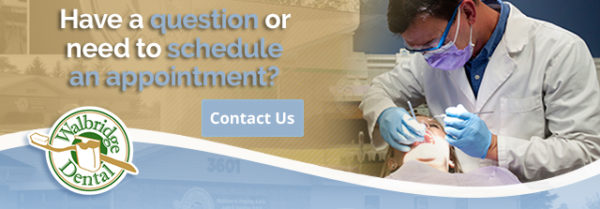
When is the last time you brushed your teeth? How about the last time you flossed? If your answer wasn’t the same for both questions (and if it’s not “this morning”) then you’re probably not taking proper care of your teeth! You likely know that brushing is important, but if you don’t consider the benefits of flossing to be worth the effort, you’re setting yourself up for oral health woes.
Do You Need to Floss?
In no uncertain terms, yes! If you think of your teeth as five separate surfaces (top, front, back, side and side) you’ll realize that brushing is only effective on three of those surfaces. That leaves 40 percent of the surfaces of your teeth uncleaned against bacteria, plaque and tartar.
Toothbrushes are designed to excel at what they can accomplish. They keep the visible surfaces of your teeth clean from bacteria by wiping away bacteria or particles of food that can damage your enamel and cause cavities.
However, without flossing, you can’t do the same for the parts of your teeth that bristles can’t reach. More importantly, teeth have contact points between them – and these are ideal locations for bacteria to hide. What would you say if a waiter served you food on a plate that was only 60 percent clean?
Remember that when you have problems with the chewing surfaces of your teeth, you can often identify them right away. Pain or discomfort is a dead giveaway that your oral health is at risk. But cavities that form between teeth often go unnoticed for far longer than chewing surface cavities. You likely won’t even realize you have them until your dentist identifies them in an x-ray or during an oral exam.
The longer cavities have to set in, the more aggressive the treatment will need to be. What could be corrected with a simple filling could now require a root canal. Problems that a root canal could have solved may require pulling your teeth and replacing them with an implant. It’s another reason why regular dentist visits are critical to your health!
The Primary Benefits of Flossing
Like any dental care step, the primary benefit of flossing your teeth is avoiding cavities. Every part of every tooth you have is susceptible to acidic attacks from bacteria or foods. Over time, these attacks will wear away at the protective enamel and leave your teeth vulnerable. Once bacteria begin to wear into the tooth itself, you’ll be on the road to cavities, sensitivity and possibly even losing that tooth!
Additionally, flossing is another step in the fight against gum disease. Brushing cleans a majority of your gums – but like teeth, there are still gaps where bristles of a toothbrush simply aren’t effective. If you skip flossing, these are the locations in your mouth where bacteria will finally find a foothold.
Once gum disease begins, it starts you on a path towards serious health risks. You could get an infection while your body perpetually fights against the foreign bacteria. Ultimately, left untreated, gum disease will lead to lost teeth and weakened oral bones. Chronic gum disease is even connected to heart disease!
You Should Floss Every Day!
One of a dentist’s greatest challenges is teaching patients the importance of flossing. The second challenge is reminding them that they floss every day.
Brushing only takes about two minutes for an optimal clean. To floss completely, you may need to double that time to ensure you clean every gap in your mouth. While it may sound like a lot of extra work, it’s still less than five minutes of your day each time you do it!
Bacteria damages your teeth the moment it makes contact. It constantly assaults your enamel and teeth until it’s cleaned away. If you brush daily but only floss occasionally, you’re leaving your teeth unprotected for most of the week. While you may stop most bacteria from forming into plaque, it still does incremental damage to the surfaces between your teeth.
Brush and floss every day. Your permanent teeth are only permanent if you clean them. And once they’re gone, there’s no natural way to restore them.
Tips for Easy Flossing
Brushing is pretty easy. Especially if you have a powered toothbrush! Flossing can be a bit more of a challenge – especially if you have dexterity issues due to age or illness. However, there are ways to make sure flossing is feasible for almost everyone. Follow these tips to ensure you can floss and floss effectively.
Use Enough Floss to Comfortably Hold
When things are difficult, many tend to give up. A common mistake with flossing is using too little thread. If you don’t grab enough thread, you won’t be able to hold the string. It may fall out of your fingers or require such a gentle flossing motion that it can’t clean your teeth effectively.
Don’t be shy! Grab enough floss to wrap around your middle fingers and pinch between your thumb and forefingers. Pull it tight and get flossing! If you think you grabbed too much, you can always shimmy the thread a bit to floss your next set of teeth with clean threading.
Use Floss Pick
There are dozens of reasons that using regular floss may not work for you. Arthritis or illnesses that impact dexterity are some of the most common reasons patients feel like they can’t floss.
Fortunately, you can find threaded floss picks that only require one hand and can be comfortably gripped – some have handles as long as a toothbrush! These make flossing much easier and can let you clean your teeth quickly.
Try Water Flossing
If threaded flossers don’t work, there are still other options. Water flossers use pressurized jets of water to force food and bacteria out from between your teeth. All they require is for you to fill the basin and aim the flosser at the gaps between your teeth. No force is required, and the handles are easy to hold.
One extra benefit of water flossers is that you can add a little fluoride mouthwash to the water to give your teeth extra protection along with flossing!
Do You Have Dental Health Questions? Schedule an Appointment!
We can help make sure you and your family are brushing correctly. If you’re concerned or just looking for information, the professionals at Walbridge Dental provide complete family dental care to families in the Millbury community. Contact us online to set up an appointment now or call us at 419-836-1033.
Connect on Social Media!

